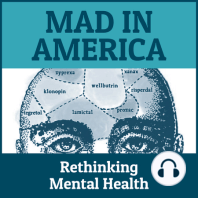42 min listen

Jonathan Raskin - Constructing Alternatives to the DSM
Jonathan Raskin - Constructing Alternatives to the DSM
ratings:
Length:
17 minutes
Released:
Apr 17, 2019
Format:
Podcast episode
Description
On MIA Radio this week, MIA’s Jessica Janze interviewed Dr. Jonathan Raskin, in the Department of Psychology at the State University of New York at New Paltz where he serves as department chair and teaches classes in psychology and counselor education. Dr. Raskin’s research is focused on constructivist meaning-based approaches in psychology and counseling. He recently authored a textbook titled Abnormal Psychology: Contrasting Perspectives. Dr. Raskin describes a recent article he wrote (What Might an Alternative to the DSM Suitable for Psychotherapists Look Like?) that highlights psychotherapists’ dissatisfaction with the Diagnostic and Statistical Manual of Mental Disorders, fifth edition (DSM-5) and suggests some principles for building alternative models. What follows is a transcript of the interview, edited for clarity. **************** JJ: Welcome, Jonathan. I'm very excited to have you. Is there anything else you want to add about your background for our readers before we get started? JR: No, not at all. Thank you for inviting me to do this. JJ: Let's get started. What made you interested in working on alternative diagnostic systems for use in psychotherapy? JR: Yeah, that's a good question. I've always been interested in how people make meaning, and diagnostic systems are the way that mental health professionals make meaning of their client's experiences. So to me, all diagnostic systems are meaningful systems for making sense of the problems our clients bring to us. JJ: You take a constructivist approach to thinking about diagnosis. Can you break down what that means for us and how it applies to this issue of diagnosis? JR: Many theories fall under the banner of constructivism, but broadly speaking, constructivism focuses on how people both individually and in conjunction with one another (and in more social kinds of configurations) construct understandings of themselves and the world. Then they use those constructions to guide their lives. To me, constructivism seems like an excellent theoretical approach to use in understanding diagnosis because each diagnostic approach can be viewed as a constructed meaning system for understanding and conceptualizing client concerns. JJ: Several alternative diagnostic systems have been promoted in recent years, including HiTop, the Power Threat Meaning framework, RDoC, and the PDM. What are your thoughts on these alternatives? JR: I think they're all interesting in their own ways. Let me talk about a few of them. I'll start with HiTop. That's the hierarchical taxonomy of psychopathology. It's a dimensional approach that tries to address the problem of comorbidity that afflicts DSM categories. Comorbidity is a confusing issue for people. When disorders are comorbid, they're diagnosed at the same time. One of the problems is that a lot of the DSM diagnoses are comorbid with one another. If you have too much comorbidity, the question that arises is, are the categories that we've constructed distinct from one another? HiTop thinks that comorbidity should be embraced instead of rejected. They say, “Yes, these DSM categories cluster together, we can group each of them under these broader spectrums.” The HiTop system uses six spectrum dimensions. Ultimately, the people who created HiTop feel that DSM disorders might be discardable, but for the time being, we can keep them. They say that there are really these co-morbid overlapping categories underneath these higher levels, six distinct spectra. HiTop sees this as a simpler approach because you can divide people's problems into how they score along these six different spectrum dimensions. It's still very early going. I think it has a lot in common with the big five personality research. If you like those, you'll like HiTop. If you don't like those, you might not be a fan of HiTop. Let me talk a little bit about RDoC. RDoC is the research domain criteria system. It's a research initiative at the moment. It's not a diagnostic system yet
Released:
Apr 17, 2019
Format:
Podcast episode
Titles in the series (100)
Gordon Warme - The Relationship Between Culture and Psychiatric ‘Disorders’: Mad in America: science, psychiatry and social justice by Mad in America: Rethinking Mental Health